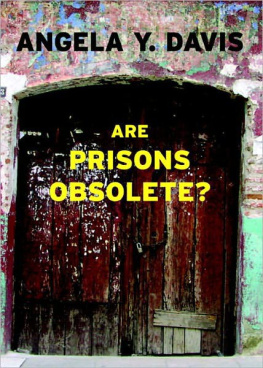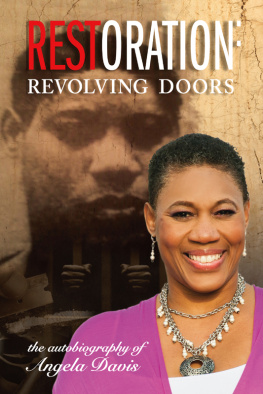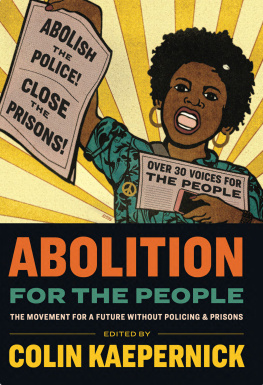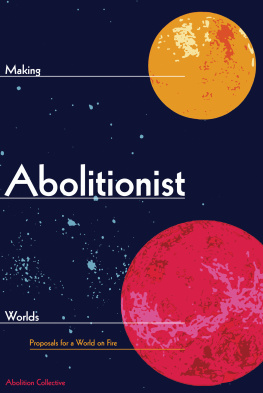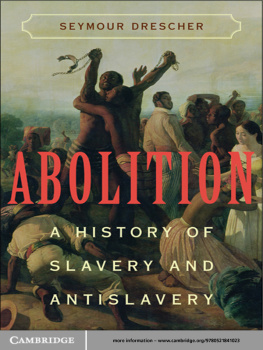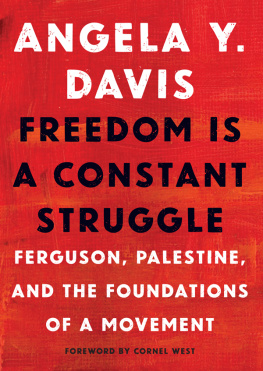Angela Y. Davis [Davis - Are Prisons Obsolete?
Here you can read online Angela Y. Davis [Davis - Are Prisons Obsolete? full text of the book (entire story) in english for free. Download pdf and epub, get meaning, cover and reviews about this ebook. year: 2011, publisher: Seven Stories Press, genre: Politics. Description of the work, (preface) as well as reviews are available. Best literature library LitArk.com created for fans of good reading and offers a wide selection of genres:
Romance novel
Science fiction
Adventure
Detective
Science
History
Home and family
Prose
Art
Politics
Computer
Non-fiction
Religion
Business
Children
Humor
Choose a favorite category and find really read worthwhile books. Enjoy immersion in the world of imagination, feel the emotions of the characters or learn something new for yourself, make an fascinating discovery.
- Book:Are Prisons Obsolete?
- Author:
- Publisher:Seven Stories Press
- Genre:
- Year:2011
- Rating:5 / 5
- Favourites:Add to favourites
- Your mark:
Are Prisons Obsolete?: summary, description and annotation
We offer to read an annotation, description, summary or preface (depends on what the author of the book "Are Prisons Obsolete?" wrote himself). If you haven't found the necessary information about the book — write in the comments, we will try to find it.
With her characteristic brilliance, grace and radical audacity, Angela Y. Davis has put the case for the latest abolition movement in American life: the abolition of the prison. As she quite correctly notes, American life is replete with abolition movements, and when they were engaged in these struggles, their chances of success seemed almost unthinkable. For generations of Americans, the abolition of slavery was sheerest illusion. Similarly,the entrenched system of racial segregation seemed to last forever, and generations lived in the midst of the practice, with few predicting its passage from custom. The brutal, exploitative (dare one say lucrative?) convict-lease system that succeeded formal slavery reaped millions to southern jurisdictions (and untold miseries for tens of thousands of men, and women). Few predicted its passing from the American penal landscape. Davis expertly argues how social movements transformed these social, political and cultural institutions, and made such practices untenable.
In Are Prisons Obsolete?, Professor Davis seeks to illustrate that the time for the prison is approaching an end. She argues forthrightly for decarceration, and argues for the transformation of the society as a whole.
In this brilliant, thoroughly researched book, Angela Davis swings a wrecking ball into the racist and sexist underpinnings of the American prison system. Her arguments are well wrought and restrained, leveling an unflinching critique of how and why more than 2 million Americans are presently behind bars, and the corporations who profit from their suffering. Davis explores the biases that criminalize communities of color, politically disenfranchising huge chunks of minority voters in the process. Uncompromising in her vision, Davis calls not merely for prison reform, but for nothing short of new terrains of justice. Another invaluable work in the Open Media Series by one of Americas last truly fearless public intellectuals. Cynthia McKinney, former Congresswoman from Georgia -- Review
About the AuthorANGELA YVONNE DAVIS is a professor of history of consciousness at the University of California, Santa Cruz. Over the last thirty years, she has been active in numerous organizations challenging prison-related repression. Her advocacy on behalf of political prisoners led to three capital charges, sixteen months in jail awaiting trial, and a highly publicized campaign then acquittal in 1972. In 1973, the National Committee to Free Angela Davis and All Political Prisoners, along with the Attica Brothers, the American Indian Movement and other organizations founded The National Alliance Against Racist and Political Repression, of which she remained co-chairperson for many years.
Angela Y. Davis [Davis: author's other books
Who wrote Are Prisons Obsolete?? Find out the surname, the name of the author of the book and a list of all author's works by series.

